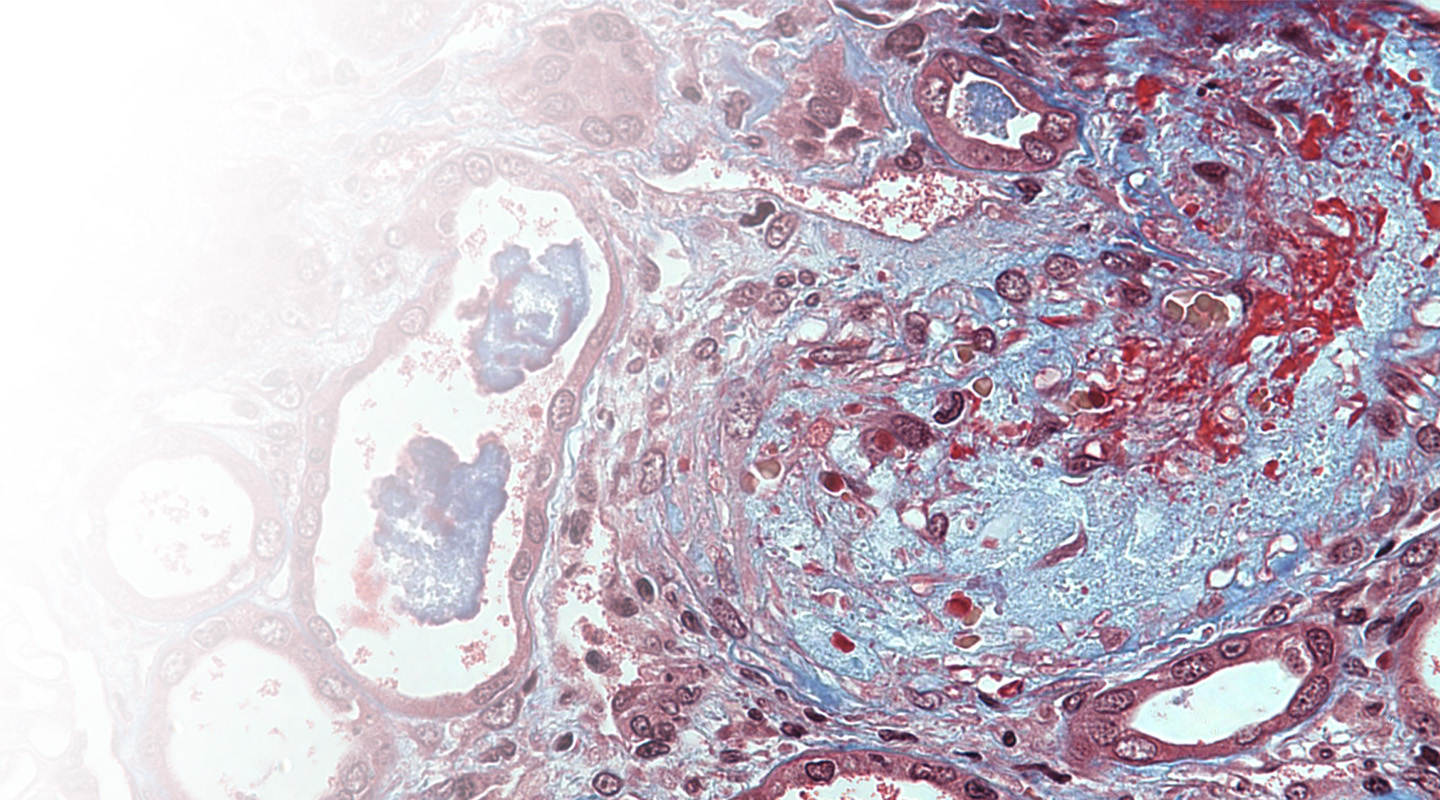Renal Pathology
A Subspecialty Of Anatomic Pathology

About Renal Pathology
Stanford’s Renal Pathology Practice provides comprehensive diagnostic expertise and services for medical diseases (non-tumor) of the kidneys. To obtain a diagnosis for these cases, the renal pathologist will synthesize findings from a range of supporting studies including: light microscopy, electron microscopy, immunofluorescence and immunohistochemistry. The service also reviews renal transplant biopsies to identify possible rejection of the transplanted organ as well as evaluate for drug toxicity and infections.
Our Services
Submit a Specimen
Our Faculty
Ancillary Testing
Stanford’s Renal Pathology Service provides diagnostic expertise for non-neoplastic kidney cases in both adult and pediatric population. We offer a full range of diagnostic evaluation for primary glomerular, tubulointerstitial, and vascular diseases of the kidney, and systemic diseases such as lupus and systemic vasculitides. Renal pathology cases require extensive clinical-pathological correlation and as such, clinical information provided (eg. serum creatinine, serological studies for hepatitis and lupus, and the degree of proteinuria) are incorporated into the interpretation of the renal biopsy.
The Medical Renal Pathology Service also reviews biopsies of transplanted kidneys to identify possible rejection, infections and drug toxicity of the transplanted organ. Our team provides diagnostic excellence for evaluation of allograft biopsies in both adult and pediatric population.
Renal biopsies are evaluated routinely by the three modalities of light microscopy, immunofluorescence microscopy, electron microscopy and as needed, immunohistochemistry.
Our service includes assignment of a renal pathology fellow/faculty to each case for individualized service, including call-backs with updates and final results. The renal Pathology Service also offers Nephrologists direct access to the service via an on-call cell phone staffed by an on-service faculty member.
Consultative Opinions & Case Reviews
When a Pathologist, Nephrologist or patient not being treated at Stanford has a challenging renal pathology case, has a specific question pertaining to further management, or would like a second opinion, their pathology material can be sent for review to the consult service. One of our renal pathology faculty will provide their consultative opinion on the case.
Primary Pathology Diagnosis
Stanford’s Medical Renal Pathology Service performs gross and microscopic examination and reporting of wet tissue cases including routine evaluation via light microscopy, immunofluorescence and electron microscopy.
Preliminary light microscopic and immunofluorescence and/or immunohistochemical results are called or faxed to the referring physician within 12-24 hours from receipt of the specimen. Final diagnosis including electron microscopy results are typically reported within three to four working days from receipt of the specimen.
Consult Cases
To submit slides for case review, please fill out a Stanford requisition form and include all slides, relevant clinical documents, and ancillary testing materials and reports. If possible, please include a block, as it will expedite the finalization of the case should additional testing be necessary. Package all materials securely and send via a padded envelope.
Wet Tissue Specimens
Stanford offers a renal biopsy collection kit with specimen containers for light microscopy, immunofluorescence and electron microscopy. Please call to request kidney biopsy kits.
All samples should be labeled with the patient information (Name, date of birth, patient address, and one other unique identifier) and sealed in a biohazard bag. Please submit a signed Stanford requisition with each sample.
Renal Biopsies
Learn more about proper collection and handling of renal biopsies:
We do offer stat requests for same day and weekend review as clinically indicated. To send a STAT case, please contact the on-call renal cell phone and clearly indicate on the requisition who to call with the preliminary results. Nephrologists have direct cell phone access to the on call Renal Pathologist.
Samples and consult materials should be shipped or delivered via courier to:
Stanford Anatomic Pathology
Attn: Renal Pathology
300 Pasteur Drive, Room H2110
Stanford, CA 94305
Phone: 650-723-7211
Fax (650) 725-7409
New Client Inquiries
To arrange to be set up as a new client, please contact:
ClinOpsContracts@stanfordhealthcare.org.
Contact Us
To submit a specimen to Renal Pathology, please complete a requisition and send with sample to:
Stanford Renal Pathology Service
300 Pasteur Drive, Room H2110
Stanford, CA 94305
Phone: 650-723-7211
Fax (650) 725-7409
(Pathologist staffed)
Medical Director:
Neeraja Kambham, MD
To arrange to be set up as a new client, please contact:
ClinOpsContracts@
stanfordhealthcare.org
SAMPLE SUBMISSION LOGISTICS
For more information on submitting cases, see the links below:
All Requisitions
Download Stanford Requisitions for specimen submission.
Account Set-up
Information on personalized requisitions, supplies, shipping and courier pick-up.
Pricing Inquiries
Pricing inquiries and contract information.
Billing
Billing policies, information and questions.
Results Web Portal
Request access or log-in to our client results portal.
Specimen Collection and Handling
Specifications for Specimen Collection and Handling.
Consult Service FAQ's
Get answers to Frequently Asked Questions.
Neeraja Kambham, MD

APPOINTMENTS
- Professor of Pathology
- Medical -Director, Renal Pathology Service
- Medical Director, Electron Microscopy Service
- Program Director, Renal Pathology Fellowship
PRACTICE AREAS
- Renal Pathology
- Medical Liver Pathology
- Anatomic Pathology
CONTACT
Email: neeraja.kambham@stanford.edu
Phone: (650) 725-5193
More information about Neeraja Kambham:
https://med.stanford.edu/profiles/neeraja-kambham
https://profiles.stanford.edu/neeraja-kambham
John Higgins, MD

APPOINTMENTS
- Professor of Pathology
- Co-Director, Post-Sophomore Fellowship in Pathology
- Associate Residency Program Director for Anatomic Pathology
PRACTICE AREAS
- Liver Pathology
- GI Pathology
- Renal Pathology
- Transplant Pathology
- Pathology and Laboratory Medicine
- Anatomic and Clinical Pathology
CONTACT
Email: john.higgins@stanford.edu
Phone: (650) 723-7211
More information about John Higgins:
https://med.stanford.edu/profiles/john-higgins
https://profiles.stanford.edu/john-higgins
Richard K. Sibley, MD

APPOINTMENTS
- Professor of Pathology
PRACTICE AREAS
- Anatomic Pathology
- Pathology
CONTACT
Email: Richard.Sibley@stanford.edu
Phone: (650) 723-8002
More information about Richard Sibley:
https://med.stanford.edu/profiles/richard-sibley
https://profiles.stanford.edu/richard-sibley
Megan Troxell, MD, PhD

APPOINTMENTS
- Professor of Pathology
- Co-Director, Post-Sophomore Fellowship in Pathology
- Program Director, Surgical Pathology Fellowship Program
PRACTICE AREAS
- Anatomic Pathology
- Breast Pathology
- Renal Pathology
- Genitourinary Pathology
- Transplant Pathology
CONTACT
Phone: (650) 723-1410
More information about Megan Troxell:
https://med.stanford.edu/profiles/megan-troxell
https://profiles.stanford.edu/megan-troxell
Ancillary Testing
Renal Pathology relies heavily on a suite of ancillary testing offerings to support our expert diagnosis. Each case incorporates three modalities of light microscopy, , immunofluorescence, electron microscopy and as needed immunohistochemistry.
Immunohistochemistry »
Immunohistochemical staining for polyoma virus, cytomegalovirus and other viruses, serum amyloid A, B-and T-lymphocyte subsets, IgG & IgG4 heavy chain and C4d is performed on formalin fixed tissue sections (obtained from submitted paraffin blocks or unstained sections).
Immunofluorescence »
We perform direct immunofluorescence on frozen tissue samples. Routine testing includes staining for C3, IgG, IgM, IgA, C1q, kappa, lambda, fibrinogen and albumin. Additional antibodies that may be applied to the tissue include serum-associated amyloid (A), amyloid P, transthyretin (amyloid subtyping), a2, a3 and a5 chains of type IV collagen (Alport syndrome panel), Fibronectin, IgG heavy chain subclass identification (IgG1-4), and PLA2R (membranous nephropathy).
Electron Microscopy »
Electron microscopy is used to confirm and/or establish a diagnosis.
Stanford’s Renal Pathology Service provides diagnostic expertise for non-neoplastic kidney cases in both adult and pediatric population. We offer a full range of diagnostic evaluation for primary glomerular, tubulointerstitial, and vascular diseases of the kidney, and systemic diseases such as lupus and systemic vasculitides. Renal pathology cases require extensive clinical-pathological correlation and as such, clinical information provided (eg. serum creatinine, serological studies for hepatitis and lupus, and the degree of proteinuria) are incorporated into the interpretation of the renal biopsy.
The Medical Renal Pathology Service also reviews biopsies of transplanted kidneys to identify possible rejection, infections and drug toxicity of the transplanted organ. Our team provides diagnostic excellence for evaluation of allograft biopsies in both adult and pediatric population.
Renal biopsies are evaluated routinely by the three modalities of light microscopy, immunofluorescence microscopy, electron microscopy and as needed, immunohistochemistry.
Our service includes assignment of a renal pathology fellow/faculty to each case for individualized service, including call-backs with updates and final results. The renal Pathology Service also offers Nephrologists direct access to the service via an on-call cell phone staffed by an on-service faculty member.
Consultative Opinions & Case Reviews
When a Pathologist, Nephrologist or patient not being treated at Stanford has a challenging renal pathology case, has a specific question pertaining to further management, or would like a second opinion, their pathology material can be sent for review to the consult service. One of our renal pathology faculty will provide their consultative opinion on the case.
Primary Pathology Diagnosis
Stanford’s Medical Renal Pathology Service performs gross and microscopic examination and reporting of wet tissue cases including routine evaluation via light microscopy, immunofluorescence and electron microscopy.
Preliminary light microscopic and immunofluorescence and/or immunohistochemical results are called or faxed to the referring physician within 12-24 hours from receipt of the specimen. Final diagnosis including electron microscopy results are typically reported within three to four working days from receipt of the specimen.
close Our Services
Consult Cases
To submit slides for case review, please fill out a Stanford requisition form and include all slides, relevant clinical documents, and ancillary testing materials and reports. If possible, please include a block, as it will expedite the finalization of the case should additional testing be necessary. Package all materials securely and send via a padded envelope.
Wet Tissue Specimens
Stanford offers a renal biopsy collection kit with specimen containers for light microscopy, immunofluorescence and electron microscopy. Please call to request kidney biopsy kits.
All samples should be labeled with the patient information (Name, date of birth, patient address, and one other unique identifier) and sealed in a biohazard bag. Please submit a signed Stanford requisition with each sample.
Renal Biopsies
Learn more about proper collection and handling of renal biopsies:
We do offer stat requests for same day and weekend review as clinically indicated. To send a STAT case, please contact the on-call renal cell phone and clearly indicate on the requisition who to call with the preliminary results. Nephrologists have direct cell phone access to the on call Renal Pathologist.
Samples and consult materials should be shipped or delivered via courier to:
Stanford Anatomic Pathology
Attn: Renal Pathology
300 Pasteur Drive, Room H2110
Stanford, CA 94305
Phone: 650-723-7211
Fax (650) 725-7409
New Client Inquiries
To arrange to be set up as a new client, please contact:
ClinOpsContracts@stanfordhealthcare.org.
Contact Us
To submit a specimen to Renal Pathology, please complete a requisition and send with sample to:
Stanford Renal Pathology Service
300 Pasteur Drive, Room H2110
Stanford, CA 94305
Phone: 650-723-7211
Fax (650) 725-7409
(Pathologist staffed)
Medical Director:
Neeraja Kambham, MD
To arrange to be set up as a new client, please contact:
ClinOpsContracts@
stanfordhealthcare.org
SAMPLE SUBMISSION LOGISTICS
For more information on submitting cases, see the links below:
All Requisitions
Download Stanford Requisitions for specimen submission.
Account Set-up
Information on personalized requisitions, supplies, shipping and courier pick-up.
Pricing Inquiries
Pricing inquiries and contract information.
Billing
Billing policies, information and questions.
Results Web Portal
Request access or log-in to our client results portal.
Specimen Collection and Handling
Specifications for Specimen Collection and Handling.
Consult Service FAQ's
Get answers to Frequently Asked Questions.
close Submit a Specimen
Neeraja Kambham, MD

APPOINTMENTS
- Professor of Pathology
- Medical -Director, Renal Pathology Service
- Medical Director, Electron Microscopy Service
- Program Director, Renal Pathology Fellowship
PRACTICE AREAS
- Renal Pathology
- Medical Liver Pathology
- Anatomic Pathology
CONTACT
Email: neeraja.kambham@stanford.edu
Phone: (650) 725-5193
More information about Neeraja Kambham:
https://med.stanford.edu/profiles/neeraja-kambham
https://profiles.stanford.edu/neeraja-kambham
John Higgins, MD

APPOINTMENTS
- Professor of Pathology
- Co-Director, Post-Sophomore Fellowship in Pathology
- Associate Residency Program Director for Anatomic Pathology
PRACTICE AREAS
- Liver Pathology
- GI Pathology
- Renal Pathology
- Transplant Pathology
- Pathology and Laboratory Medicine
- Anatomic and Clinical Pathology
CONTACT
Email: john.higgins@stanford.edu
Phone: (650) 723-7211
More information about John Higgins:
https://med.stanford.edu/profiles/john-higgins
https://profiles.stanford.edu/john-higgins
Richard K. Sibley, MD

APPOINTMENTS
- Professor of Pathology
PRACTICE AREAS
- Anatomic Pathology
- Pathology
CONTACT
Email: Richard.Sibley@stanford.edu
Phone: (650) 723-8002
More information about Richard Sibley:
https://med.stanford.edu/profiles/richard-sibley
https://profiles.stanford.edu/richard-sibley
Megan Troxell, MD, PhD

APPOINTMENTS
- Professor of Pathology
- Co-Director, Post-Sophomore Fellowship in Pathology
- Program Director, Surgical Pathology Fellowship Program
PRACTICE AREAS
- Anatomic Pathology
- Breast Pathology
- Renal Pathology
- Genitourinary Pathology
- Transplant Pathology
CONTACT
Phone: (650) 723-1410
More information about Megan Troxell:
https://med.stanford.edu/profiles/megan-troxell
https://profiles.stanford.edu/megan-troxell
close Our Faculty
Ancillary Testing
Renal Pathology relies heavily on a suite of ancillary testing offerings to support our expert diagnosis. Each case incorporates three modalities of light microscopy, , immunofluorescence, electron microscopy and as needed immunohistochemistry.
Immunohistochemistry »
Immunohistochemical staining for polyoma virus, cytomegalovirus and other viruses, serum amyloid A, B-and T-lymphocyte subsets, IgG & IgG4 heavy chain and C4d is performed on formalin fixed tissue sections (obtained from submitted paraffin blocks or unstained sections).
Immunofluorescence »
We perform direct immunofluorescence on frozen tissue samples. Routine testing includes staining for C3, IgG, IgM, IgA, C1q, kappa, lambda, fibrinogen and albumin. Additional antibodies that may be applied to the tissue include serum-associated amyloid (A), amyloid P, transthyretin (amyloid subtyping), a2, a3 and a5 chains of type IV collagen (Alport syndrome panel), Fibronectin, IgG heavy chain subclass identification (IgG1-4), and PLA2R (membranous nephropathy).
Electron Microscopy »
Electron microscopy is used to confirm and/or establish a diagnosis.
close Ancillary Testing
Residencies and Fellowships
Anatomic Pathology Residency Programs »
Stanford Pathology offers a 3-year Anatomic Pathology residency and 4 year combination residencies in Anatomic Pathology/Clinical Pathology and Anatomic Pathology/Neuropathology.
Renal Pathology Fellowships »
Stanford offers an ACGME-accredited Fellowship in Renal Pathology.
